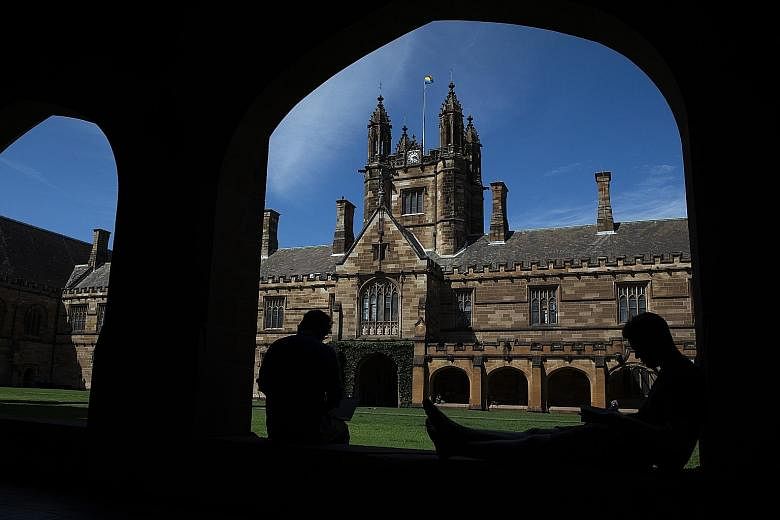Universities in Australia have offered cash to stranded Chinese students to encourage them to resume their studies and to assist them to travel to Australia via a third country so they will not be subject to a coronavirus-related travel ban.
The Australian institutions are facing estimated losses of up to A$3 billion (S$2.8 billion) due to the travel ban and have been urgently trying to find ways to allow Chinese students to continue with their enrolments.
Of the 109,000 Chinese university students enrolled in first-semester courses, about 65,800 remain in China and have been unable to travel to Australia due to the restriction. The ban prevents non-Australian citizens and residents from entering Australia if they have been in mainland China within the previous 14 days.
To assist the students, Australian universities have been offering grants, some of which are designed to encourage students to transit in a third country, where they would have to remain for at least 14 days, before coming to Australia.
Among them, Western Sydney University last week offered A$1,500 to students to make such a journey. The University of Melbourne has offered A$7,500 to assist students with forfeited flights, accommodation and other costs associated with the travel restriction. The University of Adelaide has offered "care packages" worth up to A$5,000, which includes a fee discount and a contribution towards flights.
About 13,000 students from China have reportedly entered Australia via third countries such as Thailand, Malaysia and Cambodia since the ban was imposed on Feb 1.
Australian Prime Minister Scott Morrison yesterday extended the travel ban to March 7. It will be reviewed again within a week.
The ban has taken a heavy toll on Australia's international student and travel sectors, which together contributed about A$60 billion to the economy last year. China is the largest source of Australia's foreign students and tourists.
Analysis by Deloitte Access Economics found that the number of international visitors to Australia this year is set to drop by 10 to 15 per cent - or 900,000 to 1.5 million visitors - due to the coronavirus and the bush fires.
A partner at the firm, Ms Adele Labine-Romain, told The Australian yesterday: "We have not seen any drop of this size before.
"The problem here is the tourism sector may not rebound. It's very resilient but every airline seat not filled, every hotel room unfilled, cannot be recouped."
The impact of the virus outbreak is already affecting Australian universities. Some casual staff have had their hours reduced. Universities are also reportedly considering postponing some of their major building and infrastructure works - a move that could have broader economic effects.
-
109,000
Number of Chinese university students enrolled in first-semester courses in Australian universities.
-
65,800
Number of such students remaining in China, unable to travel to Australia.
Associate Professor Salvatore Babones, an expert on the economic impact of the Chinese student influx who is from Australian think-tank Centre for Independent Studies, yesterday condemned the grants offered to Chinese university students. "It is thoroughly unethical for a university to encourage students to undertake risky, refugee-style travel in order to slip into Australia through a third-country backdoor," he told ABC News.
To assist students stranded in China, universities have been looking to offer online courses and late enrolments. Some will allow students to miss weeks or even months of class and will offer extra tutorials to help them catch up.
Thousands of Chinese students attending Australian schools have also been affected. The government indicated over the weekend that it would grant some 760 students an exemption from the travel ban. A further 1,000 Chinese research students at Australian universities were also due to be given exemptions.
But the government yesterday indicated it was likely to reverse these proposed exemptions.
Mr Morrison said yesterday there would be "no carve outs" to allow Chinese students to avoid the ban.
"We have always acted with an abundance of caution on this issue, and that has put Australia in the strong position we are in this time, in being able to contain the impact of this virus," he told reporters.

